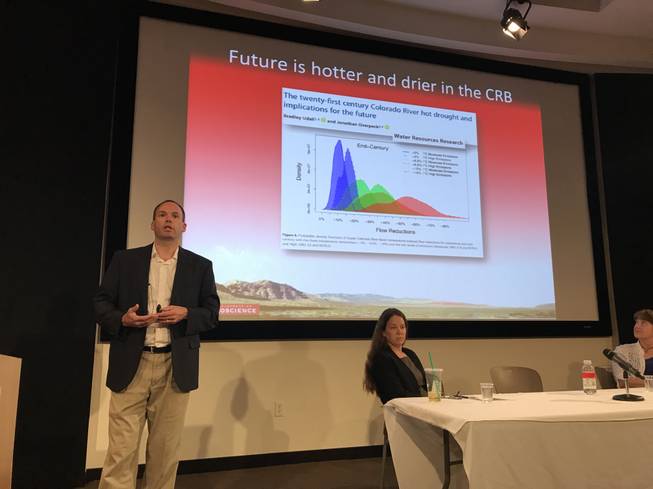
UNLV geoscience expert Matthew Lachniet explains rising temperatures in the West, as Colby Pellegrino, director of water resources at Southern Nevada Water Authority, and Lynn Fenstermaker of Desert Research Institute look on. The trio spoke during a panel discussion on climate and drought at UNLV on June 29, 2017.
Friday, Feb. 16, 2024 | 2 a.m.
A team of researchers at the Desert Research Institute and UNLV is joining forces with other regional universities to study climate challenges in the water-scarce Southwest as part of the project funded by the National Science Foundation.
The foundation is funding the Southwest Sustainability Innovation Engine, a multi-institutional consortium to confront the effects of climate change, ranging “from the desertification of Utah’s Great Salt Lake to the record-breaking extreme heat in Arizona and the dwindling supply of the Colorado River reaching Nevada,” officials said in a news release.
“This is a regional project, and it’s solving regional problems,” said Sean McKenna, executive director of hydrologic sciences for the Desert Research Institute. “Those three states are the fastest-growing region in the U.S. and also the driest ones.”
The Southwest Sustainability Innovation Engine is led by Arizona State University and supported by the University of Utah, Maricopa Community Colleges, the Water Research Foundation and regional partners like the Southern Nevada Water Authority.
The engine will receive $15 million over the first two years of the program, officials said. It can be renewed for up to 10 years with $160 million in available funding, they said.
The award “offers a new transformative avenue to apply our holistic sustainability innovation approach to the southwestern United States to keep this region on a pathway of economic growth,” said Peter Schlosser, vice president of the Julie Ann Wrigley Global Futures Laboratory at Arizona State and principal investigator on this project in a statement.
He continued, “The Southwest Sustainability Innovation Engine combines the extensive expertise of ASU and our partners to simultaneously ensure a sustainable future and prosperity for our region.”
More than 50 industry partners including private companies, nonprofits, organizations and local governments will play a part in workforce development and commercializing projects, UNLV said.
Zachary Miles, UNLV senior associate vice president for economic development, said researchers at ASU, UNLV and others involved with the engine already know each other through other collaborative efforts. They, after all, are working toward solutions with similar challenges brought on by climate change in the Southwest.
“When this came out, it was a natural fit,” Miles said. “Everybody reached out to their contacts in the area and said, ‘Hey, let’s do this.’ ”
McKenna cited OpenET, an online platform that maps evapotranspiration that DRI developed with the Environmental Defense Fund and Google Earth Engine, as an example of past projects in a similar collaborative vein. The platform provides “easily accessible satellite-based evapotranspiration (ET) data for improved water management across the western United States.”
Miles said his role in the engine would be workforce development. His goal is to create a regional hub for economic development that would attract new talent and retain the students who come through those local institutions.
“The individual institutions will be spokes to the hub, entry points for organizations or corporations in that area to access the whole hub,” Miles said.
In some cases, the universities selected for the grant are already working on similar projects to address aspects of climate change in the Southwest. Carbon capture, renewable energy and water extraction from the atmosphere are all on that list, McKenna said.
“I think there will be an institution that leads each area, but participation from the others will depend on their strengths and interests,” McKenna said.
DRI and UNLV will serve as core academic partners on the project, leading and/or contributing to project management and water innovation, workforce development, and community development teams, officials said.
“Big problems require bold solutions, and this consortium brings innovators from throughout the Southwest together to collaboratively and actively tackle the region’s most pressing water, energy and related climate challenges,” UNLV President Keith Whitfield said in a statement. “The stakes are high, but this partnership allows the best and brightest academic minds to apply their collective skills and creatively find ways to secure a sustainable future.”
